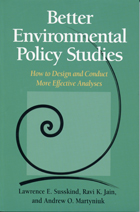
Environmental policy studies commissioned by government agencies or other stakeholders can play a vital role in environmental decisionmaking; they provide much-needed insight into policy options and specific recommendations for action. But the results of even the most rigorous studies are frequently misappropriated or misunderstood and are as likely to confuse an issue as they are to clarify it.
Better Environmental Policy Studies explores this problem, as it considers the shortcomings of current approaches to policy studies and presents a pragmatic new approach to the subject. Reviewing five cases that are widely regarded as the most effective policy studies to have been conducted in the United States in the last few decades, the authors present a comprehensive guide to the concepts and methods required for conducting effective policy studies. The book:
- describes and explains the conventional approach to policy studies and its shortcoming
- presents the history, impacts, and common elements of five successful policy studies
- offers an in-depth look at the different tools and techniques of policy analysis
- extends the concepts and principles of successful policy studies to their potential uses in the international arena
Better Environmental Policy Studies presents a practical, battle-tested approach to overcoming the obstacles to formulating effective environmental policy. It is an invaluable resource for students and faculty in departments of environmental studies, public policy and administration, and planning, as well as for professional policy analysts and others involved with making decisions and mediating disputes over environmental issues.

When business leaders, government officials, and other stakeholders come to the table in an environmental, health, or safety dispute, acrimony often results, leading to expensive and time-consuming litigation. Not only does this waste precious resources, but rarely does the process produce the best outcome for any of the parties involved.
For the past five years, the authors of this volume have conducted semi-annual seminars at the Massachussetts Institute of Technology and at Harvard to provide business leaders and regulators with the knowledge and skills they need to more effectively handle environmental, health, and safety negotiations. Their strategy, known as the "mutual gains approach," is a proven method of producing fairer, more efficient, more stable, and wiser results. Negotiating Environmental Agreements provides the first comprehensive introduction to this widely practiced and highly effective approach to environmental regulation.
The book begins with an overview of the mutual gains approach, introducing important concepts and ideas from negotiation theory as well as the theory and practice of mediation. The authors then offer five model negotiations from their MIT-Harvard Public Disputes seminar, followed by a series of real-world negotiated environmental agreements that illustrate the kinds of outcomes possible when the mutual gains approach is employed. A collection of writings by leading experts provide valuable insights into the process, and appendixes offer both instructions for conducting model negotiation sessions and analysis of actual game results from earlier seminars.
This is the only prescriptive text available for the many regulatees and regulators involved in environmental regulatory negotiations each year. Anyone involved with environmental negotiation -- including corporate and public sector managers, students of environmental policy, environmental management, and business management -- will find the book an essential resource.
READERS
Browse our collection.
PUBLISHERS
See BiblioVault's publisher services.
STUDENT SERVICES
Files for college accessibility offices.
UChicago Accessibility Resources
home | accessibility | search | about | contact us
BiblioVault ® 2001 - 2024
The University of Chicago Press









